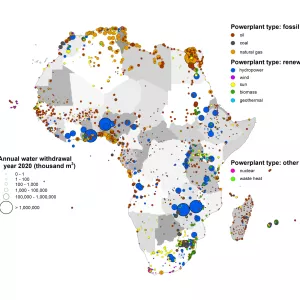New open-access database enhances sustainable development in Africa's energy and water management
The International Water Management Institute (IWMI), through the CGIAR Foresight Initiative, offers valuable statistics on water management and energy production in Africa through an open access database. IWMI’s research delivers the most detailed analysis to date on freshwater demand for electricity in Africa for the year 2020. This level of data availability is unprecedented, as prior statistics and reports have been limited.

New open-access database enhances sustainable development in Africa's energy and water management
The International Water Management Institute (IWMI), through the CGIAR Foresight Initiative, offers valuable statistics on water management and energy production in Africa through an open access database. IWMI’s research delivers the most detailed analysis to date on freshwater demand for electricity in Africa for the year 2020. This level of data availability is unprecedented, as prior statistics and reports have been limited.
Africa is predicted to have the largest population growth of any continent between now and 2050. The continent will therefore experience a surge in water demand. Water use for energy is increasing globally, but there is a high degree of uncertainty in the African context. Electricity production requires substantial amounts of water, yet no spatially detailed analysis differentiating energy types and covering the whole African continent exists for the current decade. This data gap is due to limited national availability and the placement of scientific information behind paywalls.
This research fits within the wider picture of water use in Africa. Water intensity – the amount of water required to produce a unit of energy – for different energy sources varies significantly. Reservoir hydropower exhibits high water intensity, while other renewable energy sources such as wind and solar power have low intensities. Hydropower is sensitive to climate change: productivity has recently decreased due to droughts. A diverse portfolio of renewable energy increases resilience. The selection of renewable energy to develop when decarbonizing the continent will have a great impact on overall water demand.
Through utilizing exclusively open access data, IWMI researchers and collaborators from the University of Groningen (Netherlands) and the Escuela Politécnica Nacional (Ecuador) ensure that the data remains freely available to all. This is particularly crucial in Africa because stakeholders often lack the funds to purchase data essential for decision making. As Africa experiences rapid development, this database aims to serve as an exceptional and free resource for sustainable growth.
To learn more about this research, read the article:
Gerbens-Leenes, P. W.; Vaca-Jiménez, S. D.; Holmatov, Bunyod; Vanham, Davy. 2024. Spatially distributed freshwater demand for electricity in Africa. Environmental Science: Water Research and Technology, 14p. https://doi.org/10.1039/D4EW00246F
This article is a slightly adapted version of the post by Davy Vanham and Laura Keil originally published on IWMI website.

